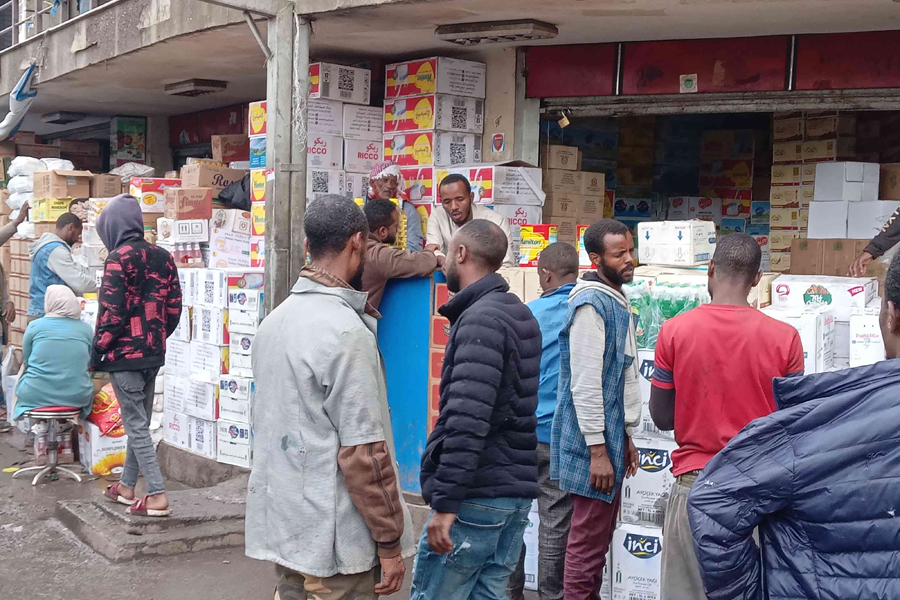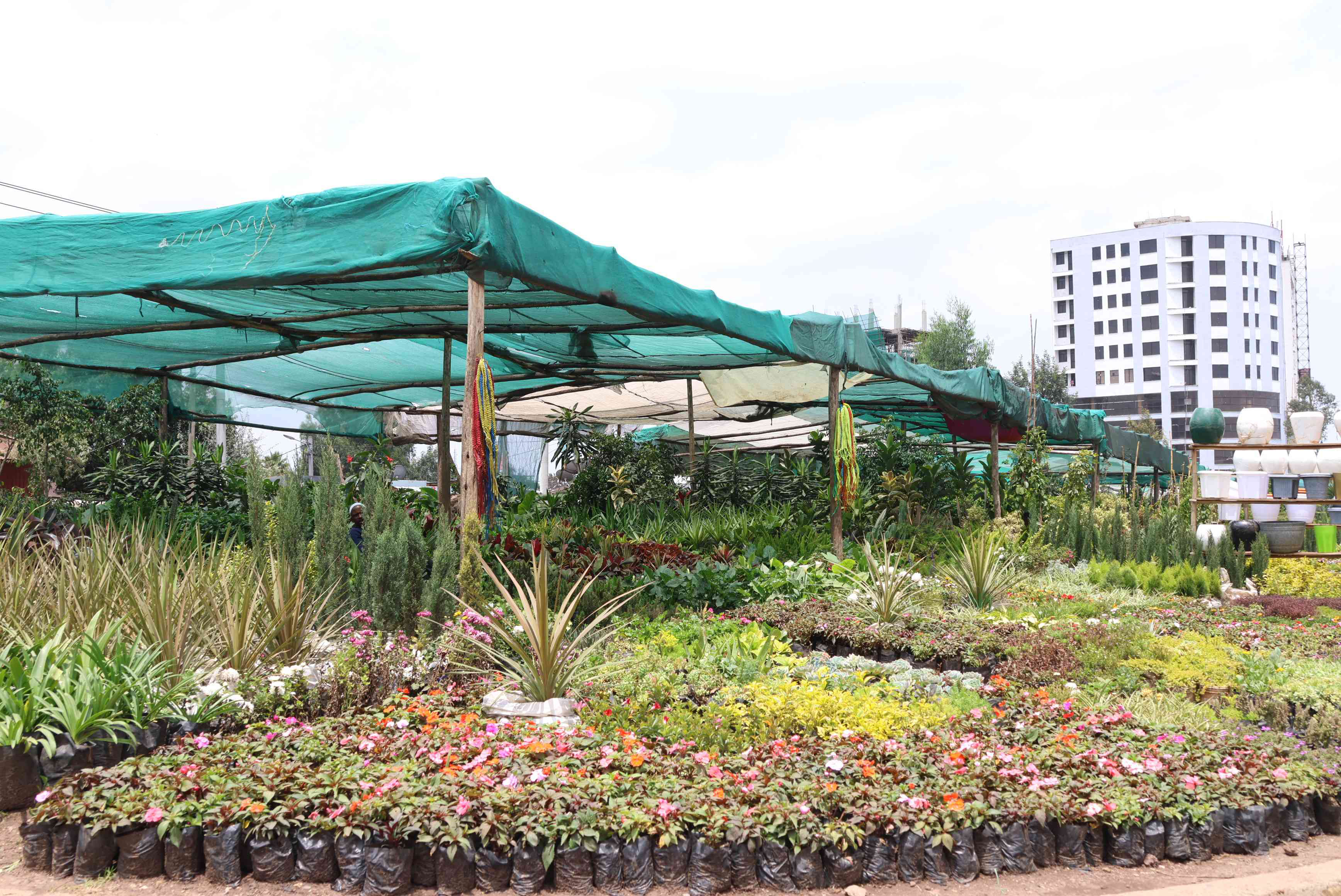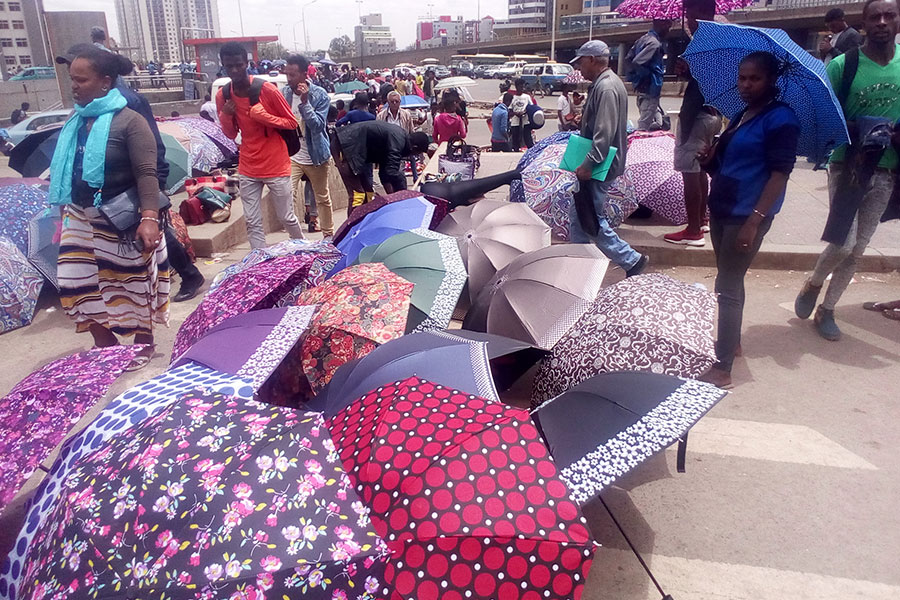
Featured | Sep 29,2024
Opened a few weeks ago, the Birmaji branch of the Cooperative Bank of Oromia (CBO), on Africa Avenue (Bole Road), was quiet and empty around lunchtime on Thursday. Two staff, an accountant and a customer service officer, were set on their back-office duties while a teller at the front desk waited for customers to walk in.
The branch has had a modest attraction to customers since its opening - up to 80 visitors a day - but, shockingly, only two people have showed up to cash out money remitted through international transfer services in that entire period of time.
Nebiyou Debele, the branch’s accountant, was bemused by the low amount of remittance coming into the branch. His experience in the current and other branches he worked at before does not give him much confidence about the country's remittance operations. Even among the few who drop by, none cash out remittances more than 1,000 dollars. The parallel market offers more than a 30pc margin to a dollar, a factor that drives customers away from the formal channels.
“People ask us if we’re awarding incentives, and leave when they learn we’re not,” Nebiyou told Fortune.
The branch where he is working now may be young, but the decline is evident in many of the Bank's 464 branches across the country. These branches generated a foreign currency inflow of 363.42 million dollars last year, 22pc of which was from private transfers and remittances.
However, a marked decline in the number of people going through the banks for remittance is a trend many in the industry find deeply worrying.
The size of the Ethiopian diaspora community is estimated to reach three million, mainly concentrated in the United States, the Middle East and Europe. It has made Ethiopia one of the main destinations for remittance globally. It was one of the top 10 remittance-receiving countries in Sub-Saharan Africa along with Nigeria, Ghana, Senegal, Kenya, and South Africa, according to the World Bank’s Migration & Remittances Factbook, released in 2015.
Remittance is a major source of foreign currency to low and middle-income countries. Migrants’ remittance inflows to developing countries have consistently surpassed official development aid over the last two decades and can even exceed the value of foreign direct investments. Two years ago, it had reached an all-time high of over half a trillion dollars.
This is consistent with what Ethiopia has witnessed over the years. For the decade since 2011, revenues from foreign direct investment were short of 15.5 billion dollars, less than half of the 37 billion dollars the country received through remittance, as data from the National Bank of Ethiopia (NBE) shows. Neither were revenues from export earnings any match to it. The figures for two decades show remarkable growth in remittance, from 233 million dollars in 2003 to 5.6 billion dollars in 2019, the year when revenues from exports were below three billion dollars.
The significance of remittance to the balance of payments is not to be understated.
Nib International Bank accepts remittance inflow through ten operators.
The trend in remittance, commonly understood as money transfers made from migrants to friends and families in their place of origin, ran into a hitch in the past fiscal year, registering a one-billion-dollar drop. Although the severity differs among banks, most, including the state-owned Commercial Bank of Ethiopia (CBE), where the largest share comes through, have reported a decline in their respective foreign currency earnings.
CBE had an inflow of 1.8 billion dollars (only 139m dollars was from exports) in the first half of the last fiscal year, which made up 36pc of the national total during that period. Ordinarily, the Bank's earnings make up to 70pc of the national amount, which has dropped significantly to 1.4 billion dollars in the current fiscal year, almost a quarter lower.
The Cooperative Bank of Oromia, where Nebiyou works, had a relatively similar experience. The flow of foreign currency through remittance declined by 7.76pc in the last fiscal year, from 55.7 million dollars.
The significant drop in the amount of remittance last year could have been caused by the shift of the parallel market to utilising diaspora accounts, in addition to the economic strain of the COVID-19 pandemic, says Kiflu Degefe (PhD), a researcher at the Policy Studies Institute.
The outbreak of the COVID-19 pandemic, which brought economic recession across the world, may have contributed to the decline. Nonetheless, the rapid rise of the informal transfer has a significant impact, observed Deribe Asfaw, president of the Cooperative Bank of Oromia.
His bank may have seen a two-million-dollar rise in foreign currency mobilisation in the past nine months of the current fiscal year, compared to the same period last year, but the President is unsatisfied; two million dollars is "nothing" for a bank of its size.
"People still think that money sent through Western Union can only be withdrawn from the CBE," Deribe told Fortune.
Alongside MoneyGram, Ria, Dehabshill, and WorldRemit, Western Union is one of the main money transfer companies active in the Ethiopian market.
The slight increase of inflow in this fiscal year might seem like a glimpse of hope for the banks, but the sustenance of the parallel market through a global pandemic proves otherwise. The global remittance market is characterised by high transaction costs and limited competition among service providers. This encourages widespread use of informal transfers, presenting the toughest challenge for bankers and policymakers. This is especially true in places where the exchange market is closed, such as in Ethiopia, and rates from the formal market are far lower than what the markets on the street offer.
There is little known about the scale of informal remittance in Ethiopia. Data from the central bank shows that it has grown exponentially from 756 million dollars in 2010 to 2.3 billion dollars a decade later, making up 49pc of the total amount of inward remittance registered last year.
However, a study conducted three years ago tells a different story. According to the International Organisation for Migration, around 78pc of remittance flow though some corridors to Ethiopia goes through informal channels.
Experts in the sector raise their concerns on this. The amount of illegal inflow could be underplayed, as the method of computation to determine informal remittance by the central bank is simplistic. It is calculated as the residual from the balance of exports, imports, and direct remittance. Considering inaccuracies in the official reports from the central bank, the flow of remittance through informal channels could be higher.
The widening gap between the official and parallel market rate must have played its part; this has encouraged people to send money home through informal channels, according to Abdulmenan Mohammed, a finance expert based in London.
Those in the banking industry attribute the high disparity to the increasing gap between rates people get from the official and the parallel markets. They are not off the mark in their assessment.
A young mother of two who works in a private company receives support sent from a relative in the United States on every holiday. This relative sends, through Western Union, up to 300 dollars. When the exchange rates at the banks began to lag significantly behind those available on the black market, up to 56 Br to a dollar, she quickly changed sides. An additional 4,200 Br from as small a transaction as 300 dollars was good enough for her to switch over.
Sofia Ibrahim manages the remittance division at Nib International Bank, where forex transfer declined by up to 40pc in recent years. She has seen the inflow stabilise and says that it is moving at a constant rate in this fiscal year, despite occasional surges during holiday seasons. She understands that people have a valid reason for receiving money through informal channels; but says that the issue goes beyond individuals.
In addition, Sofia explained that though the amount that used to come in through diaspora accounts was high, it has been dropping alarmingly since the new directive was issued.
“It’s just been a month," said Sofia. "We’ll know the real effects in a couple of months.”
The National Bank of Ethiopia (NBE) passed a directive last month ordering diaspora account holders that receive inward remittance to surrender one-third of what they receive to its coffers. Its officials claim that they were determined to fight illicit transactions that have undermined the forex market and allocations that disadvantage domestic manufacturers.
The forex acquired through illicit remittance services is used for dubious activities, research done on illicit financing in Ethiopia indicated. It can be used to make informal payments, acquire properties, and, usually, finance under-invoiced purchasing, a scheme importers use to acquire foreign currency to pay for imports of goods. They request a small amount from banks through letters of credit and pay for the rest through the parallel market.
This has put the banks in a desperate bid to attract those with access to forex, devising marketing schemes to lure customers offering moderate to lavish incentives worth millions of Birr. From a token in mobile credit to generous offerings in loan financing for vehicles and house purchases, the race to the bottom is fierce in the industry.
These are schemes hoped to bring in a huge amount of foreign currency to the banks, according to Sofia.
The authorities have taken a series of measures to pull the plug on the informal money transfer market. Cracking down on the streets in the capital known to have forex transactions has continued. They have also imposed restrictions on the number of transactions in Birr, retention of foreign currency earnings, and utilisation of diaspora accounts.
However, it is too early to weigh the results of the recent directives, although the banks have seen positive outcomes, Frezer Ayalew, banking supervision director at the central bank, told Fortune.
The industry wants to see major policy changes beyond legal sanctions to address the foreign exchange shortages. For Deribe, increasing domestic productivities and availing a win-win mechanism through which the country and foreign investors can benefit should be the focus.
"The government should have a strict control mechanism, not just stringent policies to control illicit trade activities in under-invoicing and over-invoicing," he said.
Healthy competition should be fostered within banks to provide an innovative solution for the problems, according to Deribe.
"Other competitors are coming in before we have learned how to compete," the President told Fortune.
Some African countries with a liberalised foreign exchange market are less troubled by illicit trade. A good example is Kenya, where remittance in its entirety comes through formal channels.
"So long as there is a shortage of foreign currency in the formal channels, the parallel market will exist,” said Abdulmenan. “Legalising the parallel market is a better option.”
Kiflu concurs. Opening up the foreign exchange market for a market-based regime is a sustainable remedy in the long run. However, when to do that is highly dependent on the amount of foreign currency reserve available to cushion the inevitable hemorrhage and the performance of the export sector.
PUBLISHED ON
Apr 24,2021 [ VOL
22 , NO
1095]

Featured | Sep 29,2024

Radar | Jun 20,2020

Fortune News | Aug 04,2024

Fortune News | Dec 17,2022

Fortune News | Dec 12,2020

Fortune News | Jul 27,2025

Viewpoints | Mar 20,2021

Radar | Apr 13,2019

Commentaries | Sep 20,2025

Featured | Sep 18,2021

Dec 22 , 2024 . By TIZITA SHEWAFERAW
Charged with transforming colossal state-owned enterprises into modern and competitiv...

Aug 18 , 2024 . By AKSAH ITALO
Although predictable Yonas Zerihun's job in the ride-hailing service is not immune to...

Jul 28 , 2024 . By TIZITA SHEWAFERAW
Unhabitual, perhaps too many, Samuel Gebreyohannes, 38, used to occasionally enjoy a couple of beers at breakfast. However, he recently swit...

Jul 13 , 2024 . By AKSAH ITALO
Investors who rely on tractors, trucks, and field vehicles for commuting, transporting commodities, and f...

Oct 18 , 2025
The political establishment, notably the ruling party and its top brass, has become p...

Oct 11 , 2025
Ladislas Farago, a roving Associated Press (AP) correspondent, arrived in Ethiopia in...

Oct 4 , 2025
Eyob Tekalegn (PhD) had been in the Governor's chair for only weeks when, on Septembe...

Sep 27 , 2025
Four years into an experiment with “shock therapy” in education, the national moo...